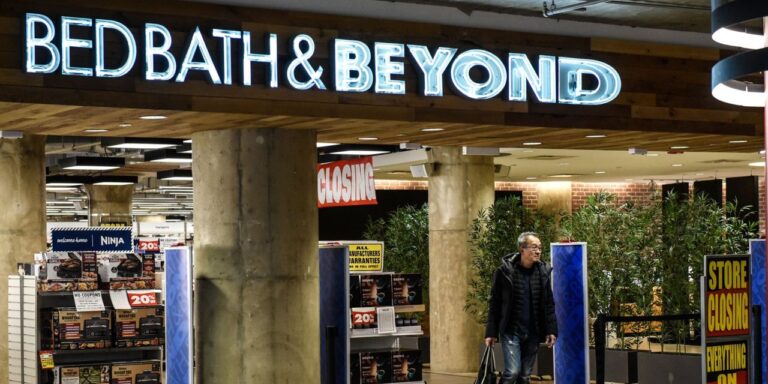
[ad_1]
Text size

Wedbush analyst Seth Basham is skeptical that the Bed Bath & Beyond can pull off the deal.
Stephanie Keith/Bloomberg
Bed Bath & Beyond
‘s move to raise equity has depressed its stock and lifted its bonds as investors try to understand the terms of a dilutive and very complex offering.
The troubled retailer, which had said it faced the prospect of bankruptcy if it can’t raise $1.025 billion in the equity offering, said late Tuesday that it completed the deal. That brought in initial gross proceeds of approximately $225 million, while management expects to receive an additional $800 million in future installments, if certain conditions are met.
The terms of the transaction, laid out in a securities filing at midday Tuesday, offer clues about why investors might want to invest in the embattled company, which said in January that it was in default on certain borrowings and didn’t have the cash needed to meet demands for immediate repayment.
Wall Street isn’t convinced that the plan will succeed. Wedbush analyst Seth Basham lowered his price target on Bed Bath stock to nothing from $1 on Tuesday, arguing in a research note that he saw a “low probability” that the company would be able to raise equity and viewed it as a “last gasp” before filing for bankruptcy. The company said late Tuesday it isn’t certain that it will be able to raise the full amount.
The prospect of dilution, which the retailer flagged in a filing Monday, appears to have depressed Bed Bath & Beyond stock, which closed down 49% at $3.01 after rising 92% before the retailer disclosed its plan on Monday. The company’s debt prices have surged, albeit from very depressed levels.
The retailer issued $237 million of convertible preferred securities for gross proceeds of $225 million. Those securities will convert into 100 million shares, nearly equal to the current amount outstanding of 117 million, at a conversion price of $2.37 a share. But the conversion could be done at a lower price than $2.37 a share, implying more stock issuance, based on Barron’s reading of the term sheet. In certain circumstances, the holders have the option to convert their shares into common stock at a price as low as 72 cents a share.
The company expects to raise another $800 million in gross proceeds by issuing more convertible preferred securities on similar terms.
Bond investors see the willingness of equity investors to put money into a company that was viewed until recently as hopeless as a bullish sign. If fully successful, the equity deal and $100 million of new borrowings would be used to pay off debt outstanding under a $1.13 billion credit facility.
Bed Bath & Beyond’s 3.749% bonds due in 2024 quadrupled in price to 25 cents on the dollar on Tuesday, while the company’s 5.165% bonds due in 2044 nearly doubled to 14 cents. These prices are still very depressed; most junk bonds trade within 20 cents of face value of 100.
They suggest that the company may still have to file for bankruptcy. Management said in disclosing the equity offering that bankruptcy was likely if the sale doesn’t go through.
Holders of least $75 million of the preferred stock and newly issued five-year common stock warrants will get a pro-rated interest in 84,216 warrants to buy 84,216 shares of the convertible preferred shares. The company can force the holders of the warrants to convert them into convertible preferred shares in certain circumstances. That would raise the remaining $800 million.
If the stock surges, those participating in the deal could score by converting the preferred into common at $2.37 a share. But if the company can’t avoid a bankruptcy, the preferred holders could get wiped out.
The most likely explanation of why equity investors would be prepared to put $1 billion into Bed Bath & Beyond is that they think that the equity infusion will buy the company time for a turnaround. “This transformative transaction will provide runway to execute our turnaround plan,” CEO CEO Sue Gove said late Tuesday.
In its filing Monday, the company said it sees improving business and financial conditions later in its fiscal 2023, which starts around March 1. It said it expects comparable sales to increase at a percentage in the mid to high single digits for the year, after falling 30%-40% in the first fiscal quarter.
It said it expects margins on earnings before interest, taxes, depreciation, and amortization to be in the mid single-digit for the year following $1 billion in cost cuts.
Alternatively, the equity investors in this deal may think that Bed Bath & Beyond will continue to be a meme stock and will move higher, allowing them to cash out of the convertible preferred stock at a profit. There is enormous trading volume in the stock: 219 million shares changed hands on Tuesday.
Write to Andrew Bary at [email protected]
[ad_2]